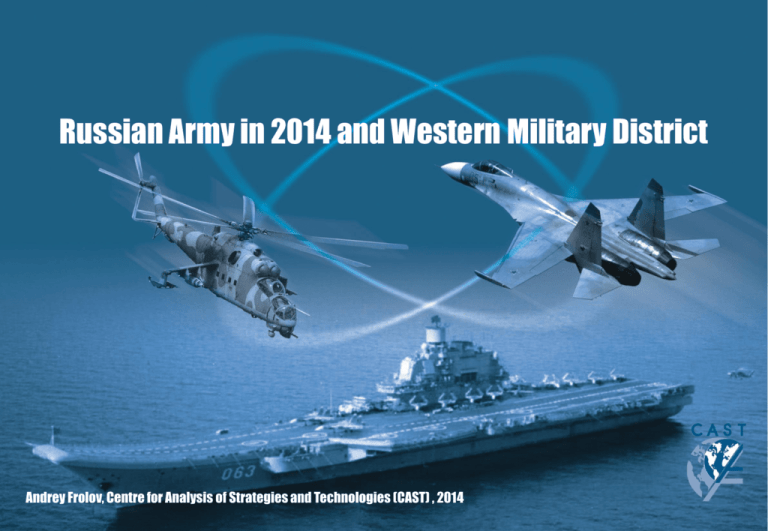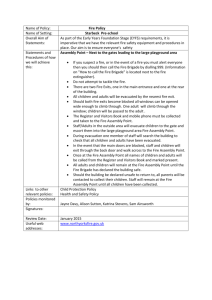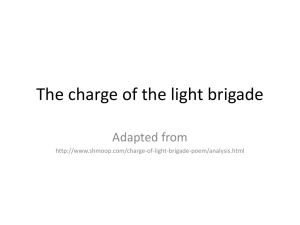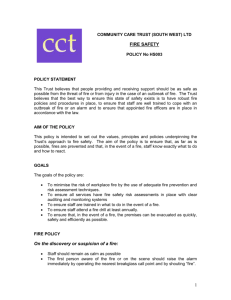Russian Army in 2014 and Western Military District
advertisement

Russian Army in 2014 and Western Military District Andrey Frolov, Centre for Analysis of Strategies and Technologies (CAST) , 2014 0 Russian army, general data Russia is the second world military power taking into account its strategic arsenal and the third as a conventional military power. Russia holds the third place in the world regarding its defense spending. The “paper” number of enlisted men is 1000000, but real figure is 800000. Strategic deterrent forces: ~489 strategic launchers and ~1700 nuclear warheads: 311 missiles, 11 SSBNs (180 SLBMs), 66 strategic bombers. Active units account 2800 tanks, 7500 AIFV, 5500 pieces of artillery, 200 tactical missiles. Air Force consists of ~100 long-range bombers, 700 fighters, 400 attack aircraft, 400 attack helicopters, 600 utility helicopters (*all figures are estimates). Main guidelines of security &defense policy of Vladimir Putin’s third presidency Strengthening of international security. Denial of confrontation. Resistance to proliferation of the nuclear weapons, local conflicts & crisis, terrorism, drug trafficking. Reliable defense of Russia in order to maintain it sovereign & independent policy, develop its economy and democratic institutes. Confirmation of the amount of State Armament Program – 22 trln rubles up to 2020. 2 The main military challenges & threats according to Vladimir Putin The diminishing of the importance of nuclear weapons due to the low probability of the conflict among nuclear powers. The development of the new gen weapons based on new physical principles. Inadequate structure of the Armed Forces Russia inherited from former USSR The need of dynamic development of the Army structures, nuclear and space industry, military-industrial complex, military education, military science and applied research 3 Russian Army by 2014 Starting in 2008 the “New Look Army” reform succeeded by 2011 under minister of defense Anotoly Serdyukov. Russian Army’s military latest military reform has become the most radical since the creation of the Red Army in 1918. The key reason of three years transformation is the shifting from traditional “mobilized” army to the permanent combat readiness army. The conceptual basis for the military reform is the “reorientation” of the “New Look Army” to the limited scale conflicts such as war against Georgia in August 2008. The defense against great powers has to be provided by the strategic nuclear forces. 4 Milestones, first stage 2008-2012 The reform’s principal features: The speedy downsizing up to the level of 1 mln men by 2012. The officer corps downsizing from 355000 up to 150000. Centralization of educational system by transformation of former 65 military high schools into 10 “basic” military universities. Reorganization and cutting off of central command structures including MoD itself and General Staff. Creation of new military districts (MD) – joint commands instead of traditional MD. “Civilization” and “commercialization” of supply and maintenance system. Transformation to combined recruiting system – with conscripts as privates and contract soldiers as NCOs. Sharp downsizing of the number of units, garrisons and bases. Army shifting to the brigade structure with elimination of regiments and divisions. The transformation of Air Defense (PVO) and Air Force (VVS) with creation of air bases instead of former armies, corps, divisions and air regiments. Creation of Space Air Defense. Transformation of the Navy 5 Milestones, second stage, 2012-2014 Main features of Sergei Shoigu’s activities: The growth of the officer corps and the number of the generals. The real growth of the number of the contract soldiers. Refusal from proposed “three-types” brigade organization (light, medium and heavy) and partial return to divisions. Superficial shift to “traditions” (the shoulder-straps on the shoulders, not on the breast, cadets defile on the Red Square during the Victory day Parade, restitution of the old names to the units etc.). The less rigid position toward the price-policy for the military hardware, the end of the price wars with the military-industrial complex. Delegation of authority to the heads of services and branches of the armed forces. The growth of the scale and the density of the military maneuvers. Priority to the Russian arms producers and decrease of the military import esp. from the Western countries. Restoring of old military high-schools and military medicine as independent bodies. 6 Financial indicators •National Defense is a real priority in terms of security Ministry of Defense budget in comparison with Ministry of Interior, bln rubles Ministry of Defense Ministry of Interior The list of arms to be acquired under SAP-2020 according Vladimir Putin 400 ICBMs & SLBMs 8 SSBNs 20 attack submarines More than 50 combat surface ships 100 satellites More than 600 aircrafts and 1200 helicopters 28 regiments of S-400 SAM 38 divisions of “Vityaz” SAM 10 brigades of Iskander-M TBM 2300 tanks 2000 self-propelled and tracked guns 8 SAP-2020 in details based on 2011-2013 data Distribution of SAP spending in 2011-2013, % Year New weapons Repairs and Upgrades R&D 2011 64 15 20 2012 66 15 18 2013 70 14 16 Defense procurement financing in 2011-2013 Year Procurement financing, bn rubles (under 3-year budget) Share of procurement in defense spending, % Finance ministry commitments / actually disbursed, bn rubles 2011 581,5 46 168 / 80 2012 726,8 50 140,7 2013 1166 60 n/a 9 Russian Defense Procurement in 2007-2013, bln roubles in current prices R&D Repair & Upgrades New Weaponry Structure of the Western Military District Western Military District (WMD) was established in September 2010 in accordance with the presidential decree of 20 September 2010 on the basis of two military districts- Moscow and Leningrad. Currently, the army and the cooling zone are deployed in the administrative borders of the three federal regions (NorthWest, Central and parts of the Volga) in the 29 subjects of the Russian Federation. District headquarters is located in St Petersburg, in a historic complex of the General Staff at the Palace Square. Western Military District - the first county formed in the new system of military-administrative division of the Russian Federation. Western Military District in focus Kaliningrad region Murmansk region Karelia St Petersburg Pskov region Leningrad region Novgorod region Archangel region Western Military District Nenets Autonomous District Vologda region Moscow Komi Western Military District is: 2500 different and separated military units 400000 enlisted militaries (on paper form, real figure is proper to 250000-300000) 40% of whole army numerical quantity (“formal” 1 mln men) 12 Western Military District key tasks Western Military District Defense of Russia’s western borders Maintain the Russia’s sea component of the strategic forces (along with Pacific fleet) Defense of Russia’s interests in the Arctic and protection of the Northern Sea Route Structure of the WMD Unified Strategic Command Combined-Arms Armies Combined-Arms Brigades 1st Command of the Air Force and Air Defence Northern Fleet Baltic Fleet Formations, units and organizations of the Arms, Special Troops and Logistics 14 WMD order of battle, ground forces 6th Combined Services Army (St-Petersburg) 25th Independent Motor Rifle Brigade (Vladimirskiy Lager) 138th Independent Motor Rifle Brigade (Kamenka) 9th Artillery Brigade (Luga) 26th Missile Brigade (Luga) 5th AA Missile Brigade (Nenimyaki) 95th Command Brigade (Chernaya Rechka) 51st Independent Supply Brigade (Krasnoye Selo) 20th Guard Combined Services Army (Mulino, Nizhniy Novgorod Region) 2nd Motor Rifle Brigade (Kalinets) 4th Tank Division (Naro-Fominsk) 6th Independent Tank Brigade (Mulino) 9th Independent Motor Rifle Brigade (Nizhniy Novgorod) 448th Missile Brigade 288th Artillery Brigade (Mulino) 9th Command Brigade (Mulino) 69th Independent Supply Brigade (Tsentralnyy) Independent units 27th Independent Motor Rifle Brigade (Vidnoye) 112th Missile Brigade (Shuya) 79th Rocket Artillery Brigade (Tver) 29th Independent Railway Brigade (Bryansk) 38th Independent Railway Brigade (Yaroslavl) 45th Independent Engineering Brigade (Nakhabino) Independent Troops Contingent in the Dniester Region WMD order of battle, air forces and air defence Air Force 15th Army Aviation Brigade (Ostrov) 378th Army Aviation Airbase (Vyazma) 549th Army Aviation Airbase (Levashovo) 800th Airbase (Chkalovskiy) 922nd Army Aviation Airbase (Pushkin) 105th Combined Aviation Division 455th Combined Air Regiment (Voronezh) 14th Fighter Air Regiment (Kursk) 98th Combined Air Regiment (Monchegorsk) 159th Fighter Air Regiment (Besovets) 790th Air Regiment (Khotilovo) Air Defense 1st Aerospace Defense Brigade (Severomorsk) 531st AA Missile Regiment (Polyarnyy) 583rd AA Missile Regiment (Olenegorsk) 1528th AA Missile Regiment (Severodvinsk) 331st Radiotechnical Regiment (Severomorsk) 332nd Radiotechnical Regiment (Arkhangelsk) 2nd Aerospace Defense Brigade (Khvoynyy) 500th AA Missile Regiment (Gostilitsy) 1488th AA Missile Regiment (Zelenogorsk) 1489th AA Missile Regiment (Vaganovo) 1490th AA Missile Regiment (Sablino) 1544th AA Missile Regiment (Vladimirskiy Lager) 333rd Radiotechnical Regiment (Khvoynyy) 334th Radiotechnical Regiment (Petrozavodsk) 16 Northern Fleet Order of battle Northern Fleet Ships Northern Fleet Submarine Command 7th Submarine Division 11th Submarine Division 24th Submarine Division 31st Submarine Division 10 1st rank ships: •1 aircraft carrier •3 missile cruisers •1 destroyer •5 large anti-submarine ships •43rd Missile Ships Division •The Kola Combined Forces Flotilla •Severodvinsk Naval Base •Northern Fleet Naval Aviation •Coastal Defense Troops 32 submarines: •6 Project 667BDRM SSBN •1 Project 941U SSBN •1 Project 955 SSBN •3 Project 949A SSGN •6 Project 971 SSN •4 Project 945/945A SSN •4 Project 671RTMK SSN •6 Project 877 diesel-electric submarines •1 Project 677 diesel-electric submarine 17 Baltic Fleet Order of battle Kaliningrad 128th Surface Ship Brigade 71st Amphibious Assault Landing Ship Brigade Baltic Naval Base, which includes: •64th Area Patrol Ship Brigade •36th Missile Boat Brigade •25th Coastal Missile Regiment •The 115th Battalion Division (i.e. detachment) of Ships Under Construction and Undergoing The Baltic Fleet’s Naval Aviation Group St-Petersburg 105th Area Patrol Ships Brigade 13th Brigade of Ships and Submarines Under Construction and Undergoing Repairs Baltic Fleet Ships •2 destroyers •2 frigates •3 corvettes •2 Project 877 diesel-electric submarines The Baltic Fleet’s forces in Kaliningrad Region include a large group of ground troops: •336th Marines Brigade •79th Independent Motorised Rifle Brigade •7th Independent Motorised Rifle Regiment •244th Artillery Brigade •152nd Missile Brigade •22nd Independent SAM Regiment 18 THANK YOU FOR YOUR ATTENTION!



